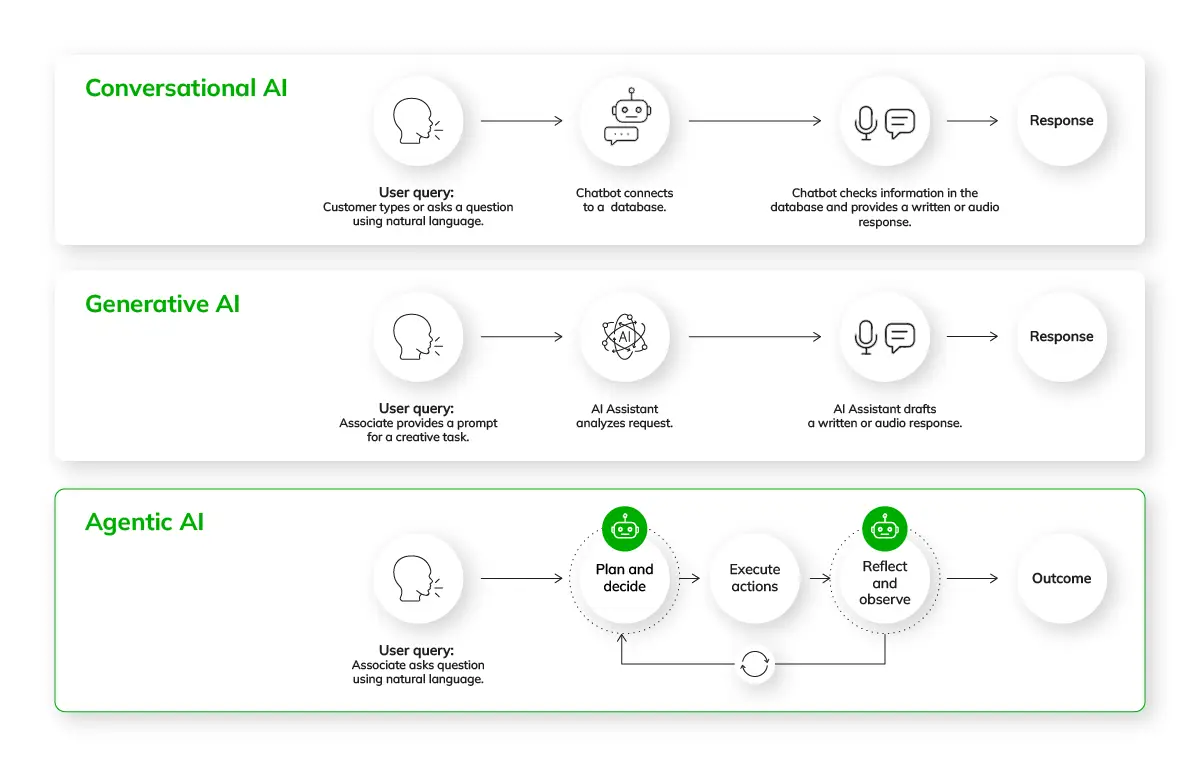
In the quest for better supply chain forecasting, more efficient processes and seamless omnichannel experiences, retailers have had to embrace rapid digital transformation and AI‑powered solutions. Once a nice‑to‑have, AI is becoming a necessity.
AI is already analyzing past performance and predicting future trends, giving retailers the insight they need to make their stores as efficient and profitable as they can be.
But what if, instead of acting on past insights provided to you by AI, you didn’t have to lift a finger to make real‑time changes to your operations? Well, that’s exactly what Agentic AI promises.
So, let’s take a closer look at this new AI technology and what it can bring to your retail business.
What is agentic AI?
Agentic AI refers to artificial intelligence systems that can act on their own based on predetermined goals. Unlike traditional automation or predictive tools, agentic AI assistants can make proactive decisions, set goals, adapt to changing circumstances and act independently to accomplish the objectives you set.
What does this actually mean for daily in‑store operations? Instead of just getting a notification about low inventory, a report on unusual sales patterns or an escalated customer complaint, an agentic AI assistant can address the issue before you even know there’s a problem.
What are the key characteristics of agentic AI?
It operates independently
Once you’ve decided the flow and goals, it can handle routine decisions without needing your approval for every action. Low on a fast‑moving SKU? It’ll automatically place the reorder based on current sales, upcoming promotions and supplier lead times.
It works toward specific goals.
You can program it with objectives such as “maintain 98% product availability” or “keep customer wait times under three minutes,” and it’ll actively work to achieve those targets as it makes microdecisions across systems and scenarios.
It prevents problems instead of just reporting them.
Instead of alerting you that you’re about to run out of shopping carts, it can identify the pattern early and automatically adjust cart collection schedules, stopping a shortage before it happens.

Agentic vs. generative vs. conversational AI: What's the difference?
Now, you might be wondering how agentic AI compares to other AI technologies you’ve heard about. In short, generative AI creates content. It’s useful for creating marketing copy, but it can also act as an educational tool by providing knowledge on demand. Conversational AI, on the other hand, is designed to handle natural conversations, making it ideal as a chat‑based AI agent. While agentic AI goes beyond such narrow tasks by making its own decisions and acting on them.
A simpler comparison is this:
- Generative AI can help you write a better job posting.
- Conversational AI can screen incoming customer calls or chats.
- Agentic AI can analyze staffing patterns, predict when you'll need additional coverage and automatically send shift offers to qualified team members.
Essentially, what sets agentic AI apart is that it makes decisions that can quickly make a difference on the shop floor.
Why the retail industry is ripe for agentic AI
Now more than ever, retailers need a way to make their increasingly complex operations easier. Not only are stores asked to create seamless omnichannel experiences, they also have to juggle seasonality, cost of living pressures, rising labor costs and constantly changing customer expectations all while still hitting their profit targets.
To do this, hundreds of decisions need to be made each day, and each decision impacts a store’s performance. But there’s just too much. No one person, or even an entire well‑trained team can possibly track every employee’s productivity, monitor each SKU’s performance, analyze customer behavior and make adjustments in real‑time. Even with the best team and systems, there are limits.
That’s why agentic AI use cases in retail are generating so much interest. It excels at handling the high‑volume, time‑sensitive decisions that consume so much of a store’s resources. And with agentic AI taking care of all those time‑consuming, mundane tasks, your teams can really focus on what matters, such as team development, customer experience improvements and operational innovations that actually move the needle for your business.
How agentic AI transforms retail operations
But let’s take a closer look at the specifics and uncover how agentic AI is already helping run better stores.
Smart store operations that actually work
Inventory management eats up more time than it should. Balancing keeping just enough stuff in stock against the cost of excess inventory while trying to predict changing demand means that stores rarely get it just right.
But here, agentic AI really shines. Instead of setting static reorder points and hoping for the best, agentic AI continuously analyzes sales velocity, seasonal trends, promotional impacts and external factors to automatically get the right stock in at the right time. This means that even things like an unexpected weather event can be factored in with agentic AI modifying projections in real‑time.
Shift scheduling becomes dramatically easier too. Rather than creating schedules weeks in advance and changing it as requests come in, it can optimize staffing based on predicted demand, employee availability and labor budget constraints. It can even automatically identify potential peaks and create opportunities for additional shifts to send to qualified team members.
Finally, it can also immediately impact waste reduction. Here it can monitors product freshness dates, track sales and automatically suggest or, in the case of electric shelve labels, implement markdown strategies to minimize losses. It can even suggest a different location to help it sell through more quickly.
Customer-facing applications that drive results
Here’s where agentic AI enhances customer service in retail in ways that directly impact your store’s performance. Instead of generic experiences, customers get personalized interactions that feel natural and helpful.
The system can recognize returning customers and pull up relevant information, such as related previous purchases, without relying on nosy staff questions. For example, a customer who bought paint last month would automatically receive offers for brushes and drop cloths in their loyalty app this month. Or someone who frequently shops in the organic section could receive early notifications about new organic arrivals.
For digital interactions, agentic AI can proactively resolve issues before they become complaints. If a customer’s online order is delayed, the system doesn’t just send an apology email. Instead, it can automatically apply appropriate compensation and expedite future orders, keeping the customer loyal and happy.
Real-time decision making that keeps you competitive
Dynamic pricing used to be something out of reach for smaller retailers. Now, agentic AI makes it accessible for anyone. The system continuously monitors competitor pricing, inventory levels, demand and margins to make pricing decisions that actively help to increase sales.
Promotions can also become more effective. Instead of blindly following seasonal calendars, it can identify the timing, targeting and pricing that will bring you the best performance based off of real‑time performance data and market conditions.
Demand forecasting can also be supercharged thanks to real‑time data integrations. Weather forecasts, local events, social media trends and economic indicators can all feed into demand predictions that help stores make better operational decisions.
Workforce assistance that empowers your team
Possibly the most impactful application for day‑to‑day operations, Agentic AI can also give your frontline team real‑time guidance and information that boosts their confidence and helps them sell more.
For example, associates can wear a device with an embedded AI assistant that provides instant access to product information, inventory status and procedural guidance. Finally, they won’t need to search the floor to find a colleague who knows whether or not a product’s compatible or a manager who can process a return. All they need to do is ask the AI assistant and they’ll immediately get the information or the person they need.
These tools don’t replace teams; they amplify their capabilities. Properly equipped, associates become more knowledgeable, more efficient and more capable of providing the kind of service that builds customer loyalty.
How agentic AI integrates with retail tech stacks
Now, you may be wondering how this technology can integrate with the systems you already have. The good news is that agentic‑AI-powered platforms are designed to work with existing retail technology rather than replacing it.
Your POS system, inventory management platform, scheduling software and IoT devices don’t need to be ripped out and replaced. Instead, agentic AI acts as an intelligent layer that connects these systems and makes them work together more effectively.
Think of it as adding a central nervous system to your store operations. Your existing systems continue handling their core functions, but now they’re coordinated by an intelligent system that can make connections and optimizations across platforms.
IoT integrations make everything smarter
When you add sensors and connected devices to the mix, agentic AI becomes even more powerful. Shelf sensors provide real‑time inventory counts, traffic counters track customer flow patterns and environmental monitors ensure optimal conditions for different product categories.
All this data flows into the agentic AI system, which processes it instantly and takes appropriate action. Low inventory triggers automatic reordering, unusual traffic patterns prompt staffing adjustments and environmental changes activate appropriate responses.
Edge computing brings AI to the sales floor
Here’s a technical detail that has practical implications: edge computing means AI processing happens locally in your store rather than relying entirely on cloud‑based systems. This ensures fast response times and continued operation even if your internet connection has issues.
For store operations, this means customer service interactions, inventory decisions and operational adjustments happen instantly without waiting for data to travel to distant servers and back.
Benefits of agentic AI for retailers
So now that we’ve seen a couple of use cases, let’s talk bottom line. What can this technology actually deliver for your store’s performance?
More time for strategic leadership
The most immediate benefit most retailers notice is how much time they get back. Instead of constantly monitoring routine operations and making repetitive decisions, store ops teams can focus on strategic initiatives that actually move your business forward.
Team development, customer experience improvements, operational innovations and growth planning, the high‑value activities that often get pushed aside by urgent operational demands, suddenly become possible because the AI handles all the mundane tasks.
Fewer costly mistakes
Human error is expensive in retail. Pricing mistakes, inventory miscounts, scheduling conflicts and missed opportunities add up quickly. Agentic AI systems don’t get tired, distracted or overwhelmed. They make consistent decisions based on comprehensive data analysis rather than gut feelings or incomplete information.
Faster response to market changes
Retail is full of situations where speed determines success. Competitor price changes, viral social trends, weather impacts supply disruptions; whoever responds fastest usually wins.
Agentic AI excels in these scenarios because they’re continuously monitoring conditions and can implement responses instantly. While you’re still analyzing what’s happening, the AI has already started adapting.

Improved team performance
When your frontline staff has access to AI‑powered tools and information, they become more capable, more confident and more effective. They can handle situations they couldn’t manage before, provide service levels that weren’t previously possible and make better decisions throughout their shifts.
This isn’t about replacing your team — it’s about making them superhuman. An associate equipped with agentic AI assistance can provide the kind of knowledgeable, personalized service that drives customer loyalty and sales growth.
Challenges and considerations
Let’s be realistic; as exciting as agentic AI is, implementing it isn’t without its hurdles. Let’s take a closer look at some things you need to consider to make your project a success.
Getting buy‑in from your team
Some of your staff will be nervous about AI systems. They might worry about job security or feel overwhelmed by new technology. Successfully implementing agentic AI requires careful change management and comprehensive training.
The key is framing AI as a tool that makes their jobs easier and more interesting rather than a threat to their employment. Focus on how these systems eliminate tedious tasks and provide better information for decision‑making.
Data quality and integration issues
Agentic AI needs access to clean, consistent data from multiple sources. If your inventory data is inaccurate, your POS integration is spotty or your supplier data is outdated, the AI won’t perform effectively.
You might need to invest in data cleanup processes and system integrations before you can fully leverage agentic AI capabilities. The good news is that these improvements benefit your operations even without AI.
Infrastructure requirements
Depending on your current technology setup, you might need infrastructure upgrades to support advanced AI systems. Reliable internet connectivity, modern point‑of‑sale systems and adequate processing power are all essential for optimal performance.
Maintaining oversight and control
One of the trickiest aspects of autonomous AI systems is maintaining appropriate oversight. You need visibility into AI decision-making processes and the ability to intervene when necessary.
This requires establishing clear parameters for AI operations, implementing robust monitoring systems and maintaining human oversight for high‑stakes decisions.
The future of agentic AI in retail
Where is this technology heading, and what should you be preparing for?
Toward fully autonomous operations
The trajectory is clear: retail operations will become increasingly autonomous over the next few years. Inventory management, pricing optimization, staff scheduling and customer service will be handled primarily by AI systems with human oversight focused on strategy and unusual cases.
This doesn’t mean eliminating human workers; it means elevating their roles from task execution to strategic thinking and customer relationship building.
Competitive advantage for early adopters
Here’s the reality: retailers who successfully implement agentic AI will have significant advantages over those who don’t. They’ll be more efficient, more responsive and better able to optimize operations for profitability and customer satisfaction.
The competitive gap will be most obvious in areas like pricing optimization, inventory management and labor efficiency. AI‑powered stores will simply be able to operate at performance levels that traditional operations can’t match.
Integration with emerging technologies
The future of agentic AI in retail will involve integration with other emerging technologies like augmented reality, advanced robotics and next-generation communication systems. These combinations will enable even more sophisticated automation and assistance capabilities.
Skills evolution for operations managers
The role of operations managers will also evolve. Instead of managing routine operational tasks, they’ll focus more on setting strategic parameters for AI systems, interpreting performance data and leading human-centered initiatives that drive business growth.
The operations managers who thrive in this environment will be those who learn to work effectively with AI systems while maintaining focus on the human elements of retail success.
Bringing agentic AI to the frontline
This brings us to an exciting development that’s particularly relevant to store ops. As agentic AI transforms how stores operate, companies like x‑hoppers are solving a critical challenge: how do you bring AI‑powered capabilities directly to your frontline team in a way that’s practical and effective?
x-hoppers’s complete retail headset system provides exactly what brick‑and‑mortar stores need: a seamless way to connect agentic AI capabilities with the people actually serving customers and executing operations on the sales floor.
Think about it: all the agentic AI capabilities we’ve discussed, such as inventory optimization, real‑time decision‑making and customer personalization, are only valuable if your team can access and act on them quickly and naturally. x‑hoppers solves this interface problem with hands‑free, voice‑activated access to agentic AI assistance.

For your daily operations, this means your associates can get instant access to inventory information, product details, procedural guidance and coordination updates without stopping what they’re doing or walking to a terminal. When the AI identifies an operational adjustment needed, it can communicate directly with the relevant team members through their headsets.
The system serves as a bridge between autonomous AI decision‑making and human execution. The AI handles analysis and planning, while your team focuses on customer interaction and task completion, with seamless coordination between the two.
What makes x-hoppers particularly valuable for physical stores is how it maintains team communication and coordination while adding AI capabilities. You’re not just getting AI assistance, you’re getting an enhanced communication system that keeps your team connected and informed throughout their shifts.
As you evaluate agentic AI solutions for your store, consider how critical the human‑AI interface will be for successful implementation. The most sophisticated AI system in the world won’t improve your operations if your team can’t access its capabilities effectively. x‑hoppers provides exactly this bridge, enabling you to leverage the full potential of agentic AI while keeping your team connected, informed and empowered.
This is what the future of retail operations looks like: intelligent systems working seamlessly with skilled human teams to deliver operational excellence that neither could achieve alone. x‑hoppers isn’t just building communication tools — it’s enabling the next generation of AI‑assisted store operations where technology amplifies human capabilities rather than replacing them.
Want to learn more about how you can support your teams with AI assistance? Check out our article on how to produce product experts or speak to a member of our team to find out how you can build your perfect human‑AI team.



